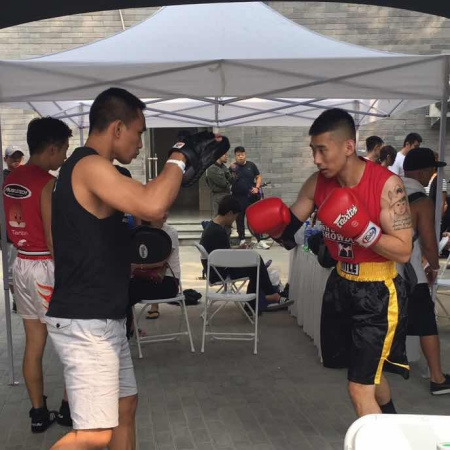
Liu Bonan spars with his coach before a fight./Photo from Liu Bonan
For the past two years, Liu Bonan has spent at least an hour, four to six days each week, in a boxing club in Beijing. Known as "Bomber" when he enters the ring, Liu trains vigorously to become better and better in the sport he has come to love.
"I like the values that you can learn in this sport; never give up and push yourself beyond the limit," he told CGTN Digital.
Liu is one of many boxers in China aspiring to become professional. On his journey to having a really big fight one day, Liu competes in amateur tournaments like the Shuangjing Showdown, which has been staged twice or thrice a year in the capital since 2015.
The attendance at every Shuangjing Showdown is indicative of the growing popularity of the sport among Chinese.
"Shuangjing Showdown serves as a platform for Beijing boxing gyms to be together, compete and make friends," James Oliver, one of the event's organizers and also a boxer, told CGTN digital. "Our events are like parties and everyone is welcome. They're a lot of fun."
Boxing in China: From past to present
The fact that athletes can train in the open now and that lots of boxing-related events are being organized across the country are major developments considering boxing was once banned in China.
The sport could also be seen as one of the bridges that connected China to the other countries, especially the US.
In 1979, at the early stages of China's opening-up to the world and when it established formal diplomatic relations with the US, it was a boxer whom President Jimmy Carter decided to designate as the American messenger of peace: No less than the legend Muhammad Ali.
On December of that same year, Ali came to China for the first time and met with Chinese leader Deng Xiaoping. He stayed for only eight hours and made quick visits to the Forbidden City and the Great Wall. Ali was the first foreign athlete to be jointly invited by the Chinese Olympic Committee and China Sports Federation.
He expressed his interest in reviving boxing in China, a sport that was banned in 1959 by Mao Zedong because it was seen then as bloody and brutal. In March 1986, the ban was officially lifted and Chinese boxers were able to compete in the 1992 Olympics in Barcelona.
Aside from the numerous boxing gyms opening and the growing demand for trainers, Oliver also noted one thing: "A big change is now boxing classes have a lot of women signing up, where traditionally it was more male-driven," he said. "This is great as it will help grow the sport and help it reach a wider audience."
World-class training for the next boxing superstar
Following the example of Muhammad Ali, another boxing legend, Manny Pacquiao from the Philippines, is now looking to help develop the sport in China.
Pacquiao was in Beijing from December 1-3 reportedly looking for a possible successor among the 1.4 billion people in the largely untapped country when it comes to boxing.
The 38-year-old Philippine senator, who controversially lost his World Boxing Organization (WBO) welterweight title to Australian Jeff Horn in July, inked a deal with Chinese sports development firm Dancing Sports on December 2 at the Diaoyutai Hotel that includes plans to build a Manny Pacquiao International Boxing Academy in the capital, the company said.
For amateur boxers like Liu, this came as good news. "I like Manny Pacquiao and I wish he can become better and better. The training here definitely needs more improvement."
China has never had a truly world-class fighter.
The country's most famous boxer, Zou Shiming, won the WBO world flyweight title, his first title as a professional, in Las Vegas with an estimated 100 million people in China watching. However, the three-time Olympic-medalist lost in his first title defense in July when he was knocked out by Japan's unfancied Sho Kimura.
In an interview with AP after Zou's Las Vegas fight, Top Rank CEO and Zou's promoter Bob Arum said his goal is to cultivate the next wave of boxing stars in China that want to follow Zou's footsteps.
"The future of boxing in China is absolutely huge," Arum said. "They have the population and the money and now the interest. We've done fights in Beijing, Shanghai and Macao and we get tremendous audiences and they're beginning to understand it. It's becoming very popular both on television and on the internet."
Oliver also sees a bright future for boxing in China. "There are more and more fight shows coming each year, organized by gyms to give their members a goal to work towards and a chance to test their abilities in competition … a great improvement from just a few years ago."
Asked about the planned Pacquiao boxing academy, Oliver said he feels like now is the right time. "His name means quality, so if he can establish a high quality training facility here and offer good training, I'm sure the boxing community will love to have it," the organizer added.
In the meantime, Liu will continue with his strict diet and hard training to achieve his dream of becoming a pro champion, one fight at a time.
(Translations by Gao Xingzi and Chen Shi)


















































